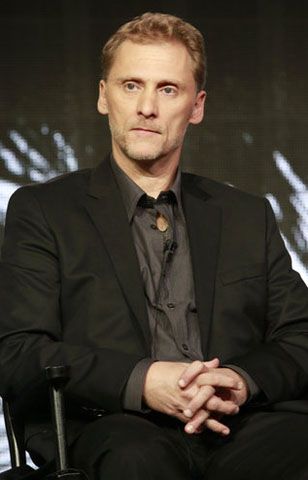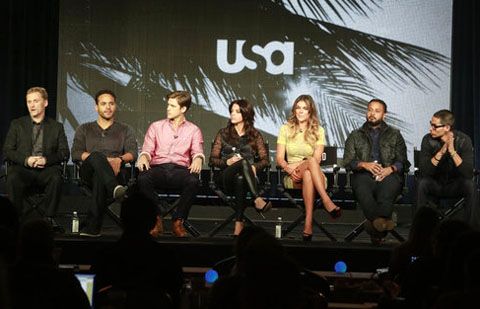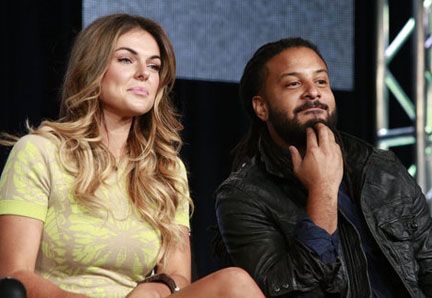Created by Jeff Eastin (White Collar) and inspired by a true story, the USA Network drama series Graceland delves into the lives of an elusive group of undercover agents from the FBI, DEA and U.S. Customs, whose worlds collide at a repossessed Southern California beachfront mansion. In such a high stress, dangerous job, lies become normal and secrets are a matter of life or death. The show stars Daniel Sunjata, Aaron Tveit, Vanessa Ferlito, Brandon Jay McLaren, Manny Montana and Serinda Swan.
While at the USA Network portion of the TCA Press Tour, executive producer Jeff Eastin talked about how the title of the show came about, how he became aware of the real beach house used by undercover agents that had been decommissioned, that this is a dark but reality-based show, the pressure that the success of White Collar puts on this new series, shooting in Florida, and the research that he found most helpful. Check out what he had to say after the jump.
Question: When you hear the name Graceland, you think of Elvis and Memphis. Why did you decide to call this show Graceland?
JEFF EASTIN: I had gone through several titles. The working title was just Safe House, which I thought was a little dull. And, just thematically for the show, I was looking at something else. Daniel [Sunjata] has got a pretty good speech about it in the pilot, where he says, “Within these walls, there’s safety.” From that idea came the idea of a sanctuary, and Graceland just flowed out of that. We say in the pilot that this is based on a true story. They would seize these houses from all sorts of guys. And in our particular case, they seized the house from a guy who was an Elvis fan. For awhile, there was going to be a big velvet Elvis hanging in the foyer, but we decided that wasn’t a good idea. But, we kept the title.
You said this was based on a true story, but is the part about Elvis true?
EASTIN: That is not true.
The pilot starts with an explanation that this house was classified for a long time, but recently become declassified. How did you first hear about this? Did USA bring this to you, or did you bring it to them?
EASTIN: I brought it to them. The idea was initially brought to me by my agents at CAA. They had met up with a guy, named John Marcello, who was the original Silvo in one of the houses. He was a DEA agent, at the time, and ended up being the house father. The particular house that I use is a model, which was set in Manhattan Beach. So, he took me down and showed me the real house that had been decommissioned, at that point, for a couple of years, and introduced me to some of the real guys who lived in the house, and they just started telling stories. At that point, I was like, “Wow, I’ve got to make this into a show.”
Graceland has more darkness to it than we’ve seen on USA before. How is the balance of that going to be, throughout the season?
EASTIN: It’s pretty much what you see in the pilot. I think the trailer does a really good job of capturing the tone of the show. For me, coming off of White Collar, which I obviously love, but now coming up on five years of that show, I’d had the Graceland script around for a little while because it was something that I really, really wanted to do. I’d always considered it the best script I’d written. I finally got to a place where I love working with USA, and I think it was mutual. I brought it out and showed it to them, and they really liked it, especially for the fact that it’s very character-driven. It is a dark show, but I consider it more of a reality-based show. Where White Collar creates its own reality, we’re trying to make this one as real as possible. Within that, it turns out there’s a lot of darkness when it comes to things like being an undercover officer. So, the show will stay within that tone. What I’m really proud of is the fact that it’s not just a dark show, but it’s actually a pretty funny show. But, instead of the laughs coming off of jokes, it comes out of the reality of what it is. That’s the tone you're going to see, throughout the full year.
Because of the success of White Collar, do you feel pressure, going into the premiere of Graceland?
EASTIN: Yeah, there’s definitely pressure. I think the one thing I learned from White Collar was to cast it right. Once you get a cast right, then you have to just really try to maintain the world that you’ve created in the pilot and keep that going. When I sat down to do Graceland, one of the first questions USA asked me is, “What can we take away from White Collar and put into this show?” And it really started with, “It may take a while, but let’s get the right cast.” Once the cast is set and they’re right, that’s 90% of the battle.
The setting of Manhattan Beach allows you to give the show a very distinct look and vibe. Are you able to shoot there, at all?
EASTIN: We’re shooting the show in Florida, and that was a big debate. The house itself, the one that I modeled it after, is set in Manhattan Beach, but we’re pretty careful to say that it’s set in Southern California. To me, it’s always been the beach culture in Southern California, which, if you're from L.A., you know very specifically. But, my parents who are in Colorado, have no idea. So, we do our best to maintain that Southern California beach look. Where our guys are is a little bit of a fictitious area, between Manhattan and somewhere down by Oceanside, where they can move. If they have a case that’s down near San Diego or a case that’s up by Venice, the house is the base and they’ve got cars. They can drive. Russell Fine, who was the DP from day one on White Collar and who ended up directing some of our better White Collar episodes, and I have a real nice shorthand. So, when it came to picking a director for Graceland, he was on my short list and ultimately did a great job.
Because she’s not in the first episode, how will Serinda Swan fit into this mix of characters?
EASTIN: Well, the good news is that we already know that she fits in very nicely, since she’s in the second episode. It was largely a matter of availability and just how pilots shoot. You’ve got to kind of pick and choose. We were actually very worried we might lose Aaron [Tveit] to Les Mis. I know that was a big question mark there, also. But for Serinda, it was worth the wait for us. I don’t think you feel it in the pilot as much just because it’s a throwaway line and you don’t really process it. But then, when you get into the next episode and she’s there, it’s suddenly, “Oh, we have an extra roommate we haven’t met yet.”
Since this is based on a real-life safe house, were there any particular books that you read for background?
EASTIN: There were a few that were really, really helpful. The Falcone book was very much a Donnie Brasco story about an FBI agent who had gone so far and gotten in really deep with the Gambino family, to the point where he was going to be a made man in the Mafia. Getting into the show, I talked to a friend of mine and her husband, who were both in Biosphere 2 – the thing in Arizona where they locked people up for a couple years. When I was introduced to the idea, she said, “Oh, it reminds me a lot of our house. We were locked in there. The only people we could really chat with were the people in the biosphere.” I said, “How did it go?, and she said, “What was interesting was that, within about three days, we had already broken into factions and hated each other. We were trying to kill each other.”
What I realized, very quickly, then was that this was very similar. They told me that the max anybody could live in the house was two years because it was so intense. You’re lying. You’re a completely different person. You have to watch everything you say because you’re going to be tripped up. What you’re saying is essentially make-believe. Then you walk into the house, and it’s the only place you can really relax and be yourself. But then, you start learning that everybody has secrets and that’s when stuff just starts getting really, really weird. That’s really what Graceland is. That becomes the theme to the show, which is that secrets beget more secrets, and suddenly there are alliances forming. So, the house itself becomes very much like this small cosmos of deceit and intrigue that these guys are forced into, where the pressure just builds up to generate stories.
Graceland premieres on the USA Network in the Summer.




